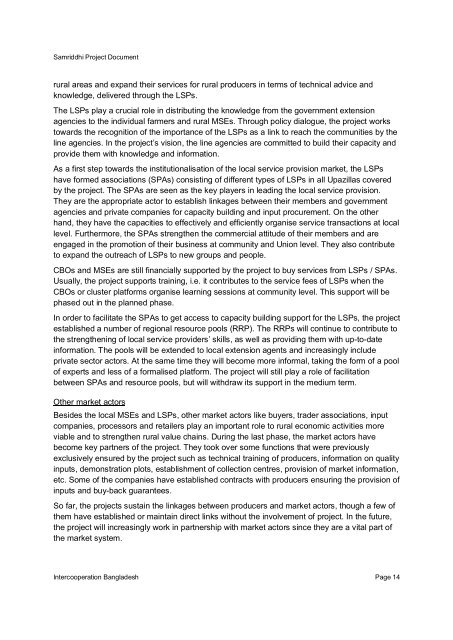Samriddhi
Samriddhi
Samriddhi
You also want an ePaper? Increase the reach of your titles
YUMPU automatically turns print PDFs into web optimized ePapers that Google loves.
<strong>Samriddhi</strong> Project Document<br />
rural areas and expand their services for rural producers in terms of technical advice and<br />
knowledge, delivered through the LSPs.<br />
The LSPs play a crucial role in distributing the knowledge from the government extension<br />
agencies to the individual farmers and rural MSEs. Through policy dialogue, the project works<br />
towards the recognition of the importance of the LSPs as a link to reach the communities by the<br />
line agencies. In the project’s vision, the line agencies are committed to build their capacity and<br />
provide them with knowledge and information.<br />
As a first step towards the institutionalisation of the local service provision market, the LSPs<br />
have formed associations (SPAs) consisting of different types of LSPs in all Upazillas covered<br />
by the project. The SPAs are seen as the key players in leading the local service provision.<br />
They are the appropriate actor to establish linkages between their members and government<br />
agencies and private companies for capacity building and input procurement. On the other<br />
hand, they have the capacities to effectively and efficiently organise service transactions at local<br />
level. Furthermore, the SPAs strengthen the commercial attitude of their members and are<br />
engaged in the promotion of their business at community and Union level. They also contribute<br />
to expand the outreach of LSPs to new groups and people.<br />
CBOs and MSEs are still financially supported by the project to buy services from LSPs / SPAs.<br />
Usually, the project supports training, i.e. it contributes to the service fees of LSPs when the<br />
CBOs or cluster platforms organise learning sessions at community level. This support will be<br />
phased out in the planned phase.<br />
In order to facilitate the SPAs to get access to capacity building support for the LSPs, the project<br />
established a number of regional resource pools (RRP). The RRPs will continue to contribute to<br />
the strengthening of local service providers’ skills, as well as providing them with up-to-date<br />
information. The pools will be extended to local extension agents and increasingly include<br />
private sector actors. At the same time they will become more informal, taking the form of a pool<br />
of experts and less of a formalised platform. The project will still play a role of facilitation<br />
between SPAs and resource pools, but will withdraw its support in the medium term.<br />
Other market actors<br />
Besides the local MSEs and LSPs, other market actors like buyers, trader associations, input<br />
companies, processors and retailers play an important role to rural economic activities more<br />
viable and to strengthen rural value chains. During the last phase, the market actors have<br />
become key partners of the project. They took over some functions that were previously<br />
exclusively ensured by the project such as technical training of producers, information on quality<br />
inputs, demonstration plots, establishment of collection centres, provision of market information,<br />
etc. Some of the companies have established contracts with producers ensuring the provision of<br />
inputs and buy-back guarantees.<br />
So far, the projects sustain the linkages between producers and market actors, though a few of<br />
them have established or maintain direct links without the involvement of project. In the future,<br />
the project will increasingly work in partnership with market actors since they are a vital part of<br />
the market system.<br />
Intercooperation Bangladesh Page 14
















